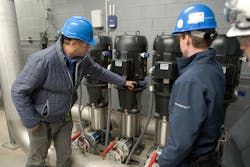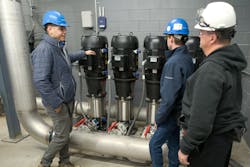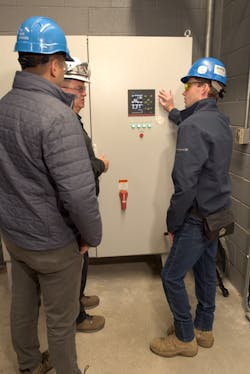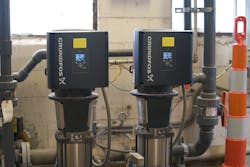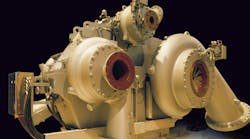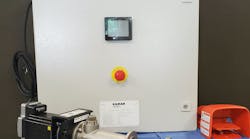Creating certain chemicals requires precise temperatures to ensure the chemical reaction yields the highest concentration of product. The addition of larger heat exchangers at a midwest U.S. chemical processing and distribution company resulted in increased capacity for its chemical production. It also caused significant strain to its aging water system. An inability to keep up with the increased load resulted in inefficient product temperatures, as well as frequent and costly service to the pumps. Each time the pumps went down, production was halted for maintenance.
“The primary challenge with the old system was reliability,” said plant project manager Craig Snyder.
The pumps became inefficient and costly to maintain. In order to accommodate a growth in the company’s production needs, the producer needed to upgrade to a reliable raw water intake system.
The solution
“Without the capability of the new Grundfos CR 95, the customer’s flow and pressure demands wouldn’t have been possible in the past,” said David Rossi, IPE territory manager.
The CR 95 is part of the expanded range of CRs, which increased the overall performance of the vertical multistage range to offer more than 1,000 gallons per minute (gpm) and 1,000 feet of head.
In this system, sensors detect system demand, and pressure and flow automatically adjust to changing environments, including water temperature changes. The automated system ensures system optimization and the highest efficiency.
When one pump requires servicing, it may be taken out of service while the other three automatically adjust to manage the load, eliminating production downtime.
The results
The new installation reduced downtime on-site. The BoosterpaQ system has allowed for flexibility, depending on the demand and temperature of the quarry water, so the producer is confident their booster system is optimized at all times.
In addition to saving energy by reducing the need for a bypass valve, the automated system also delivered immediate savings in maintenance time and cost.
It also yields higher quality product on a consistent basis.
The company also eliminated a safety hazard in the plant, which was caused by loud noise from the old pumps. Because the Grundfos pumps are quiet, there is no longer a need for hearing protection in the pump house.
“The Grundfos pumps have proven to be almost maintenance free and are very efficient,” said Ramirez. “Today, we use Grundfos pumps for 100% of our water needs, including boiler feedwater, raw water and potable water.”
Shawn Chong is a U.S. regional sales manager for Grundfos, covering the industrial market. He has been with Grundfos for the past 19 years, starting as an applications engineer and progressing to his current sales role. Chong has a bachelor’s degree in mechanical engineering and an MBA. He can be reached at [email protected].
